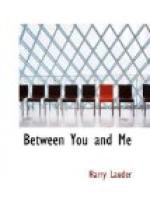Ye ken weel that Britain was no always the ane country. There were many kings in Britain lang agane. But whiles it was so armies could come from over the sea and land, and ravage the country. And sae, in the end, it was found better tae ha’ the ane strong country and the ane strong rule. Syne then no foreign invader has e’er set foot in Britain. Not till they droppit frae the skies frae Zeppelins and German Gothas ha’ armed men stood on British soil in centuries—and they, the baby killers frae the skies, were no alarming when they came doon to earth.
Now, wull we be changing all the things all our centuries ha’ taught us to be good and useful? Maybe we wull. Change is life, and all living things maun change, just as a man’s whole body is changed in every seven years, they tell us. But change that is healthy is gradual, too.
Here’s a thing I’ve had tae tak’ note of. I went aboot a great deal during the war, in Britain and in America. I was in Australia and New Zealand, too, but it was in Britain and America that I saw most. There were, in both lands, pro-Germans. Some were honest; they were wrang, and I thocht them wicked, but I could respect them, in a fashion, so lang as they came oot and said what was in their minds, and took the consequences. They’d be interned, or put safely oot o’ the way. But there were others that skulked and hid, and tried to stab the laddies who were doing the fichtin’ in the back. They’d talk o’ pacifism, and they’d be conscientious objectors, who had never been sair troubled by their conscience before.
Noo, it’s those same folk, those who helped the Hun during the war by talking of the need of peace at any price, who said that any peace was better than any war, who are maist anxious noo that we should let the Bolsheviks frae Russia show us how to govern ourselves. I’m a suspicious man, it may be. But I cannot help thinking that those who were enemies of their countries during the war should not be taken very seriously now when they proclaim themselves as the only true patriots.
They talk of internationalism, and of the common interests of the proletariat against capitalism. But of what use is internationalism unless all the nations of the world are of the same mind? How shall it be safe for some nations to guide themselves by these fine sounding principles when others are but lying in wait to attack them when they are unready? I believe in peace. I believe the laddies who fought in France and in the other battlegrounds of this war won peace for humanity. But they began the work; it is for us who are left to finish it.
And we canna finish it by talk. There must be deeds as weel as words. And what I’m thinking more and more is that those who did not do their part in these last years ha’ small call to ask to be heard now. There’d be no state for them to talk o’ sae glibly noo had it no been for those who put on uniforms and found the siller for a’ the war loans that had to be raised, and to pay the taxes.




